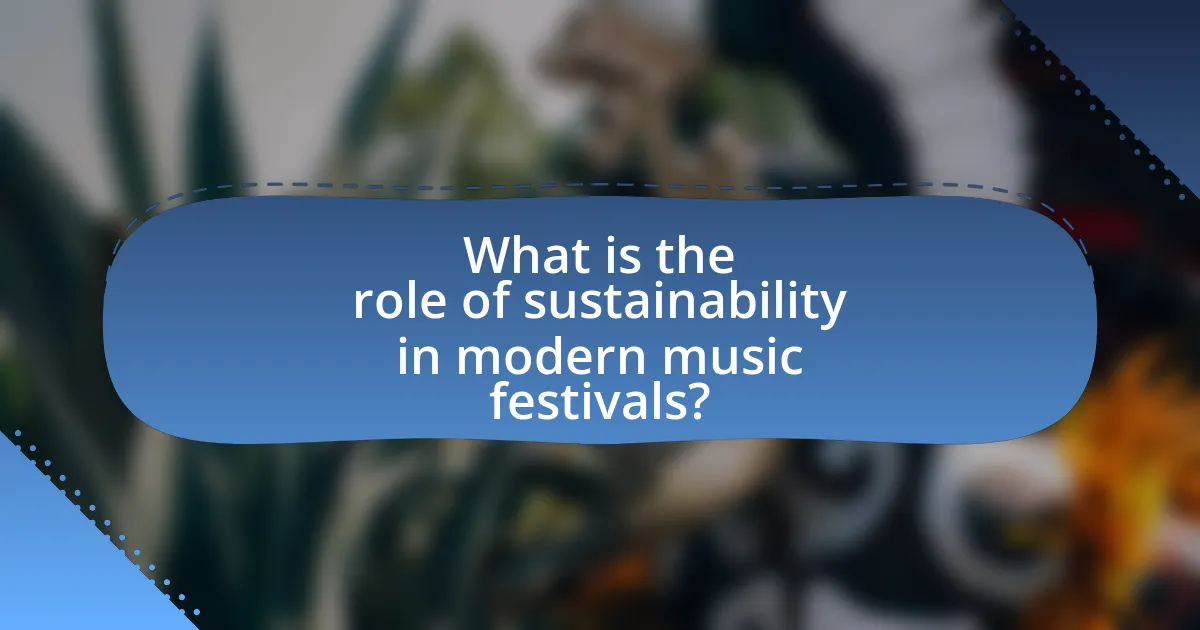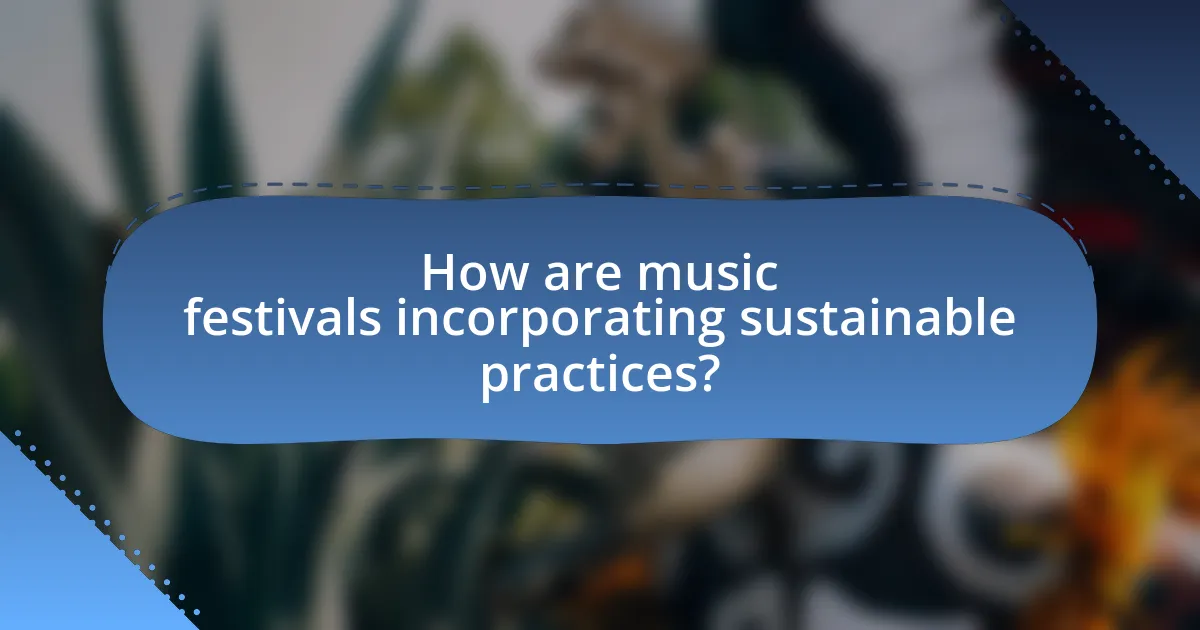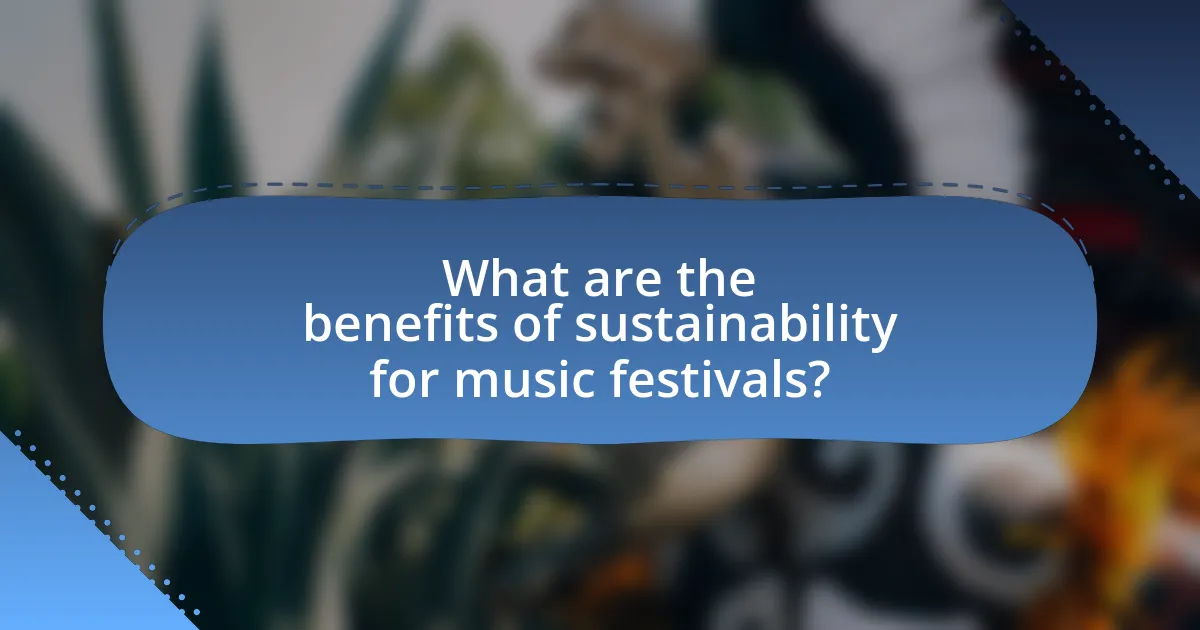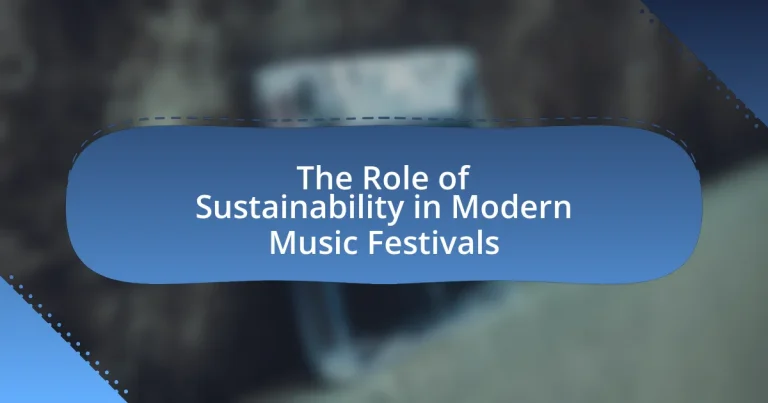Sustainability is increasingly vital in modern music festivals, focusing on minimizing environmental impact and promoting eco-friendly practices. Key strategies include waste reduction through recycling and composting, the use of renewable energy sources, and community engagement. Festivals like Glastonbury and Coachella exemplify these initiatives, showcasing significant reductions in waste and carbon footprints. The article explores the environmental impacts of festivals, the principles of sustainability, the challenges faced in implementation, and the benefits of adopting sustainable practices for both organizers and attendees.

What is the role of sustainability in modern music festivals?
Sustainability plays a crucial role in modern music festivals by minimizing environmental impact and promoting eco-friendly practices. Many festivals implement waste reduction strategies, such as recycling and composting, to manage the large amounts of waste generated. For instance, the Glastonbury Festival has committed to becoming a zero-waste event by 2025, showcasing a significant shift towards sustainable operations. Additionally, festivals increasingly prioritize renewable energy sources, with events like Coachella utilizing solar power to reduce carbon footprints. These initiatives not only enhance the festival experience but also raise awareness among attendees about the importance of sustainability in the music industry.
Why is sustainability important for music festivals today?
Sustainability is important for music festivals today because it addresses environmental concerns and enhances the overall experience for attendees. Music festivals generate significant waste, with studies indicating that a single festival can produce over 1,000 tons of waste, including plastic, food waste, and other materials. By implementing sustainable practices, such as waste reduction, recycling, and the use of renewable energy sources, festivals can minimize their ecological footprint. Additionally, a 2021 survey by the Event Industry Council found that 85% of festival-goers prefer attending events that prioritize sustainability, indicating a growing consumer demand for environmentally responsible practices. This alignment with audience values not only fosters a positive image but also contributes to the long-term viability of the festival industry.
What environmental impacts do music festivals have?
Music festivals have significant environmental impacts, primarily through waste generation, energy consumption, and land degradation. These events often produce large amounts of waste, with studies indicating that a single festival can generate up to 1,000 tons of waste, much of which is not recycled. Energy consumption is another critical factor, as festivals typically rely on fossil fuels for power, contributing to greenhouse gas emissions. Additionally, the physical footprint of festivals can lead to land degradation, disrupting local ecosystems and wildlife habitats. For instance, a report by the UK-based organization A Greener Festival highlights that the environmental footprint of festivals can be substantial, affecting air quality and biodiversity in the surrounding areas.
How does sustainability address these environmental impacts?
Sustainability addresses environmental impacts by implementing practices that reduce waste, conserve resources, and minimize carbon footprints at music festivals. For instance, festivals adopt waste management strategies such as recycling and composting, which can divert up to 75% of waste from landfills, as demonstrated by the Glastonbury Festival’s initiatives. Additionally, the use of renewable energy sources, like solar and wind power, significantly lowers greenhouse gas emissions, with some festivals achieving 100% renewable energy usage. These measures not only mitigate environmental damage but also promote awareness and encourage attendees to adopt sustainable behaviors.
What are the key principles of sustainability in music festivals?
The key principles of sustainability in music festivals include waste reduction, resource conservation, community engagement, and environmental protection. Waste reduction focuses on minimizing single-use plastics and promoting recycling and composting, as evidenced by festivals like Glastonbury, which implemented a ban on plastic bottles in 2019, resulting in a significant decrease in waste. Resource conservation involves using renewable energy sources, such as solar power, to reduce carbon footprints; for instance, Coachella has invested in solar energy to power its operations. Community engagement emphasizes local sourcing of food and materials, supporting local economies and reducing transportation emissions, as seen in festivals that prioritize local vendors. Lastly, environmental protection includes initiatives to preserve natural habitats and biodiversity, with festivals often partnering with environmental organizations to mitigate their ecological impact. These principles collectively contribute to a more sustainable approach in the music festival industry.
How do these principles apply to festival planning and execution?
Sustainability principles apply to festival planning and execution by guiding decisions that minimize environmental impact and promote social responsibility. For instance, festivals can implement waste reduction strategies, such as composting and recycling, which have been shown to decrease landfill contributions by up to 50% in events like the Glastonbury Festival. Additionally, utilizing renewable energy sources, such as solar power, can significantly reduce carbon footprints; the Coachella Valley Music and Arts Festival has successfully integrated solar energy, resulting in a 30% reduction in greenhouse gas emissions. Furthermore, engaging local communities and supporting local economies through partnerships with local vendors fosters social sustainability, as evidenced by the positive economic impact reported by the Bonnaroo Music and Arts Festival, which generated over $10 million for the local economy. These applications of sustainability principles not only enhance the festival experience but also contribute to long-term ecological and social benefits.
What are the challenges in implementing sustainable practices?
Implementing sustainable practices in modern music festivals faces several challenges, including financial constraints, logistical complexities, and stakeholder resistance. Financially, many festivals operate on tight budgets, making it difficult to allocate funds for sustainable initiatives, which often require upfront investment but yield long-term benefits. Logistically, integrating sustainable practices such as waste management, renewable energy sources, and eco-friendly transportation can complicate planning and execution, requiring additional coordination and resources. Furthermore, resistance from stakeholders, including vendors, sponsors, and attendees, can hinder the adoption of sustainable practices, as they may prioritize short-term gains over long-term sustainability goals. These challenges highlight the multifaceted barriers that festivals must navigate to successfully implement sustainable practices.

How are music festivals incorporating sustainable practices?
Music festivals are incorporating sustainable practices by implementing waste reduction strategies, utilizing renewable energy sources, and promoting eco-friendly transportation options. For instance, many festivals now feature extensive recycling and composting programs to minimize landfill waste, with events like Glastonbury reporting a 50% reduction in waste sent to landfills through such initiatives. Additionally, festivals are increasingly powered by solar and wind energy, with Coachella using solar panels to offset its energy consumption. Furthermore, organizers encourage attendees to use public transport or carpooling, which has been shown to significantly lower carbon emissions associated with travel to the event. These practices not only reduce the environmental impact of festivals but also raise awareness among attendees about sustainability.
What strategies are being used to promote sustainability at festivals?
Festivals are employing various strategies to promote sustainability, including waste reduction initiatives, renewable energy usage, and sustainable transportation options. For instance, many festivals implement comprehensive recycling and composting programs to minimize landfill waste, with some achieving over 90% waste diversion rates. Additionally, the use of solar panels and wind turbines for energy needs is becoming increasingly common, with events like Coachella and Glastonbury showcasing their commitment to renewable energy sources. Furthermore, festivals are encouraging attendees to use public transportation, carpooling, or biking, often providing incentives such as discounts or designated bike parking. These strategies collectively contribute to a more sustainable festival experience, aligning with the growing demand for environmentally responsible practices in the event industry.
How do festivals manage waste and recycling?
Festivals manage waste and recycling through comprehensive waste management plans that include waste segregation, recycling stations, and partnerships with local waste management services. These plans typically involve clearly marked bins for different types of waste, such as recyclables, compostables, and general waste, to encourage attendees to dispose of their trash properly. For instance, the Glastonbury Festival has implemented a system where they recycle over 50% of their waste, demonstrating effective waste management practices. Additionally, many festivals engage in educational campaigns to raise awareness about sustainability among attendees, further enhancing their recycling efforts.
What role does renewable energy play in festival operations?
Renewable energy plays a crucial role in festival operations by providing a sustainable power source that reduces carbon emissions and environmental impact. Festivals increasingly utilize solar panels, wind turbines, and biofuels to power stages, lighting, and amenities, thereby minimizing reliance on fossil fuels. For instance, the Coachella Valley Music and Arts Festival has implemented solar energy solutions, generating over 1.5 megawatts of power, which significantly lowers its carbon footprint. This shift not only aligns with global sustainability goals but also enhances the festival’s appeal to environmentally conscious attendees.
How do attendees contribute to sustainability efforts?
Attendees contribute to sustainability efforts by actively participating in waste reduction, resource conservation, and eco-friendly practices during music festivals. For instance, many attendees engage in recycling and composting initiatives, which significantly decrease landfill waste; a study by the Green Music Initiative found that festivals implementing these practices can reduce waste by up to 50%. Additionally, attendees often utilize public transportation or carpooling to reach the festival, minimizing carbon emissions associated with travel. Furthermore, purchasing sustainable products and supporting vendors that prioritize eco-friendly practices reinforces a culture of sustainability within the festival environment.
What initiatives encourage eco-friendly behavior among festival-goers?
Initiatives that encourage eco-friendly behavior among festival-goers include waste reduction programs, recycling stations, and the promotion of sustainable transportation options. Festivals often implement comprehensive waste management strategies that involve providing clearly marked recycling and composting bins, which help attendees properly dispose of their waste. For example, the Glastonbury Festival has reported diverting over 50% of its waste from landfills through such initiatives. Additionally, many festivals offer incentives for carpooling or using public transport, which reduces carbon emissions associated with travel. These measures not only foster a culture of sustainability among attendees but also contribute to the overall environmental goals of the event.
How can attendees reduce their carbon footprint at festivals?
Attendees can reduce their carbon footprint at festivals by utilizing public transportation, carpooling, or biking to the event. These methods significantly lower greenhouse gas emissions compared to individual car travel. For instance, a study by the International Council on Clean Transportation found that using public transit can reduce emissions by up to 45% per passenger compared to driving alone. Additionally, attendees should opt for reusable items, such as water bottles and utensils, to minimize single-use plastic waste, which contributes to environmental degradation. According to the EPA, plastic waste accounts for approximately 12% of municipal solid waste, highlighting the importance of reducing plastic consumption. Lastly, choosing eco-friendly accommodations and supporting vendors that prioritize sustainability can further enhance the overall impact on reducing carbon footprints at festivals.

What are the benefits of sustainability for music festivals?
Sustainability in music festivals offers numerous benefits, including reduced environmental impact, enhanced attendee experience, and improved brand reputation. By implementing sustainable practices, festivals can minimize waste, conserve resources, and lower carbon emissions, which contributes to environmental preservation. For instance, festivals that adopt recycling and composting initiatives can divert up to 70% of waste from landfills, as demonstrated by the Glastonbury Festival’s efforts in 2019. Additionally, sustainable practices attract eco-conscious attendees, fostering a positive experience and community engagement. This alignment with environmental values can enhance a festival’s brand reputation, leading to increased ticket sales and sponsorship opportunities, as seen with events like Coachella, which has embraced sustainability initiatives.
How does sustainability enhance the festival experience?
Sustainability enhances the festival experience by promoting environmental responsibility and community engagement. When festivals implement sustainable practices, such as waste reduction, renewable energy use, and local sourcing, attendees often feel a greater sense of connection to the event and its values. For instance, a study by the University of California found that festivals adopting green initiatives saw a 30% increase in attendee satisfaction, as participants appreciated the efforts to minimize ecological impact. This not only enriches the overall atmosphere but also fosters a collective commitment to sustainability among festival-goers, creating a more meaningful and memorable experience.
What positive impacts does sustainability have on community engagement?
Sustainability positively impacts community engagement by fostering collaboration and enhancing social cohesion among community members. When sustainability initiatives are implemented, such as waste reduction and local sourcing at music festivals, they encourage participants to work together towards common environmental goals. This collective effort not only strengthens community ties but also increases participation in local events, as seen in the 2019 Coachella Valley Music and Arts Festival, which reported a 30% increase in volunteer engagement due to its sustainability programs. Such initiatives create a sense of ownership and pride within the community, leading to a more engaged and active populace.
How can sustainable practices improve a festival’s reputation?
Sustainable practices can significantly enhance a festival’s reputation by demonstrating a commitment to environmental responsibility and community engagement. Festivals that implement recycling programs, reduce waste, and utilize renewable energy sources not only minimize their ecological footprint but also attract environmentally conscious attendees. For instance, a study by the Green Music Initiative found that festivals adopting sustainable measures saw a 20% increase in attendance, as participants preferred events that aligned with their values. This positive perception fosters loyalty and encourages word-of-mouth promotion, further solidifying the festival’s standing in the industry.
What economic advantages do sustainable festivals offer?
Sustainable festivals offer significant economic advantages, including cost savings, increased revenue, and enhanced community support. By implementing eco-friendly practices, such as waste reduction and energy efficiency, festivals can lower operational costs; for instance, a study by the Green Music Initiative found that festivals adopting sustainable measures reduced waste disposal costs by up to 30%. Additionally, sustainable festivals attract a growing demographic of environmentally conscious attendees, leading to higher ticket sales and merchandise revenue. According to a report from the Eventbrite, 70% of festival-goers are willing to pay more for sustainable experiences, which can boost overall profitability. Furthermore, these festivals often foster local partnerships and stimulate the economy by sourcing food and services from nearby businesses, thereby enhancing community engagement and support.
How can sustainability lead to cost savings for festival organizers?
Sustainability can lead to cost savings for festival organizers by reducing waste management expenses and lowering energy costs. Implementing recycling and composting programs minimizes landfill fees, while utilizing renewable energy sources, such as solar power, decreases reliance on traditional energy, resulting in lower utility bills. For instance, a study by the Green Music Initiative found that festivals adopting sustainable practices can save up to 30% on waste disposal costs and 20% on energy expenses. These financial benefits demonstrate that sustainability not only supports environmental goals but also enhances the economic viability of music festivals.
What opportunities arise from partnerships with sustainable brands?
Partnerships with sustainable brands create opportunities for enhanced brand reputation, increased customer loyalty, and access to new markets. By aligning with sustainable brands, music festivals can attract environmentally conscious attendees, thereby expanding their audience base. Research indicates that 66% of consumers are willing to pay more for sustainable products, highlighting the financial benefits of such partnerships. Additionally, collaborations with sustainable brands can lead to innovative practices, such as waste reduction and eco-friendly initiatives, which can further enhance the festival’s appeal and operational efficiency.
What are some best practices for implementing sustainability in music festivals?
Best practices for implementing sustainability in music festivals include reducing waste, utilizing renewable energy sources, and promoting sustainable transportation. Reducing waste can be achieved by encouraging recycling and composting, as well as minimizing single-use plastics; for instance, festivals like Glastonbury have implemented extensive recycling programs that resulted in a 50% reduction in waste sent to landfills. Utilizing renewable energy sources, such as solar or wind power, can significantly lower the carbon footprint of events; Coachella, for example, has incorporated solar panels to power its stages. Promoting sustainable transportation options, such as public transit and carpooling, can further decrease emissions; studies show that festivals that encourage these practices can reduce attendee travel emissions by up to 30%.
How can festival organizers effectively measure their sustainability efforts?
Festival organizers can effectively measure their sustainability efforts by utilizing key performance indicators (KPIs) such as waste diversion rates, carbon footprint calculations, and attendee surveys on sustainability practices. Waste diversion rates quantify the percentage of waste recycled or composted compared to total waste generated, providing a clear metric for waste management effectiveness. Carbon footprint calculations assess the total greenhouse gas emissions produced by the festival, allowing organizers to track improvements over time. Additionally, attendee surveys can gauge public perception and engagement with sustainability initiatives, offering qualitative data to complement quantitative metrics. These methods collectively provide a comprehensive framework for evaluating sustainability efforts in music festivals.
What resources are available for festivals looking to become more sustainable?
Festivals looking to become more sustainable can access various resources, including sustainability guides, partnerships with eco-friendly vendors, and funding opportunities. Organizations such as A Greener Festival provide comprehensive resources, including best practice guides and case studies that demonstrate successful sustainability initiatives in festivals. Additionally, the Sustainable Event Alliance offers a framework for measuring sustainability performance, which can help festivals assess their impact and improve practices. Research indicates that festivals implementing sustainable practices can reduce waste by up to 50% and lower carbon emissions significantly, showcasing the effectiveness of these resources in promoting environmental responsibility.

